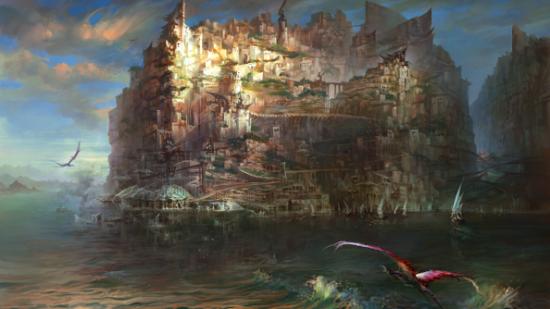Torment: Tides of Numenera wears its strangeness on its sleeve. It begins with a cavalcade of information, of alien descriptions and bizarre memories absent context. You are flung into its dream-like world almost naked and utterly clueless, forced to relive brief sequences where the choices you make will construct your version of the game’s protagonist: the Last Castoff.
Tides of Numenera’s precessor, Planescape: Torment, is in our list of the best RPGs on PC.
After wandering through these unusual, often surreal, memories, you’re faced with numerous potential versions of yourself, all dependent on the choices you’ve just made. And then there’s a fight that you can only win by delving into the minds of a menagerie of beasties, and yet more choices to make, and a Choose Your Own Adventure-style flashback that’s as confusing as it is fascinating.
This is just Tides of Numenera’s character creation.
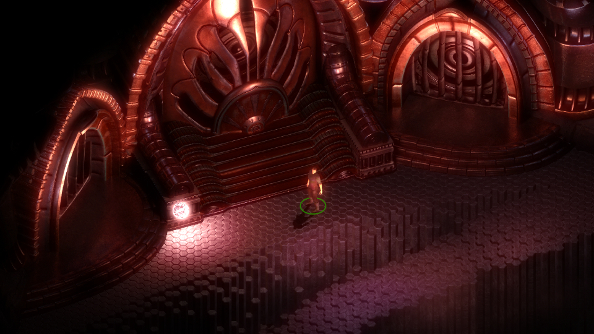
As introductions go, Tides of Numenera’s is dense. I can’t think of any denser. You are flung into the deep end, clueless, as thousands of tiny details are thrown at you at a million miles per hour. There are so many decisions to make, but they all amount to guesswork and gut instincts, which is brilliant, sure, but also a bit nerve wracking as you start to worry about how it’s going to affect the rest of this very peculiar game.
Some of your decisions will impact your ability pool, broken up into might, speed and intellect, but it feels more like you are rapidly constructing a person rather than a traditional RPG avatar. These are personality quirks, opinions and events that have already taken place rather than simple numbers on a sheet.
Ultimately, the choices I made during the introduction left me with a mystical fellow with a strong desire to understand the world and the universe, attuned to the blue and silver Tides – the name given to the game’s alignments – which represent a variety of goals and desires and traits. Blue and silver represent logic, wisdom, power, knowledge and probably a few other things that I’ve already forgotten because bloody hell there’s a lot to remember.
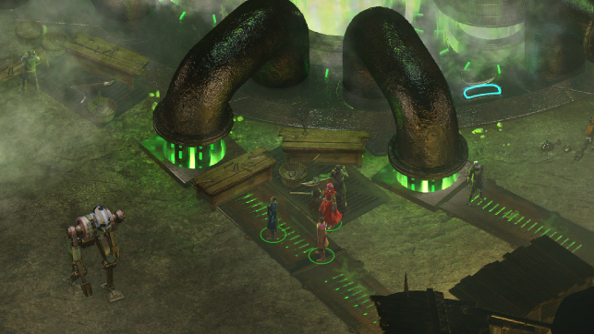
Then my screen got flipped upside down and the game crashed. Without an auto-save feature, I was forced to start again. I think I made most of the same choices, because I ended up with the same Last Castoff. There are bugs and missing features and an ugly UI to contend with, but restarting didn’t faze me; in fact, I probably needed that second run-through of the introduction so I could soak it all in.
Planescape: Torment’s influence is pretty strong from the get-go. Or, at least, Tides of Numenera is concerned with a lot of the same questions and themes as Black Isles’s classic exploration of identity and mortality: dreams, memories, what makes a person, never-ending life. It’s more high falutin, however; not as easy to digest as its predecessor. And the text, of which there is a great deal, frequently devolves into obstinately nonsensical prose evocative of Alice’s Adventures in Wonderland, but like Wonderland, the Ninth World and the city of Sagus Cliffs is a fascinating place that demands to be explored.
There’s a fountain in Sagus Cliffs that has no water, and is instead full of thousands of purple, gravity-defying fish. Criminals are punished by being drugged, which makes them spew gibberish, and the words create a fleshy homunculus that slowly strangles its victim. One of your first companions is a woman who is actually several versions of the same woman from many different dimensions. Another companion is a man covered in living tattoos. The guards of Sagus Cliffs are constructs that exist only for a single year, because they are crafted out of time sacrificed by the town’s denizens.
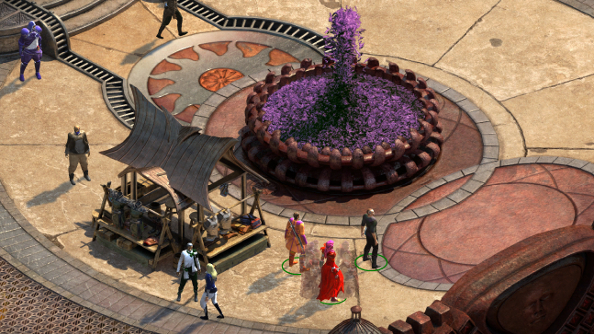
It’s a mad place, then, where almost every object and person you can interact with promises to expand on this weirdness through flashbacks and world-building, fleshing out an alien realm that’s as intriguing as it is absolutely bonkers. Planescape: Torment’s city of Sigil seems almost mundane in comparison.
I felt lost throughout most of my time wandering the Ninth World. It’s an appropriate feeling. The Last Castoff is the physical remains of an immortal body-hopper, with a newborn soul now inhabiting it. I was lost and so was he. Visions from previous lives can come at any time, just from looking at or touching random objects, and every revelation poses more questions than it answers.
The more time I spent wandering the streets of Sagus Cliffs, the more baffled I became. But it was a great kind of bafflement! The world defies expectations and is quietly subversive. Even when I thought I had begun to understand what was going on and who I was, I would immediately start second-guessing myself. And what strange questions I’ve been pondering, like: “Am I a God?” or “Why am I still carrying this weird fish in my pocket and how is it still alive?”
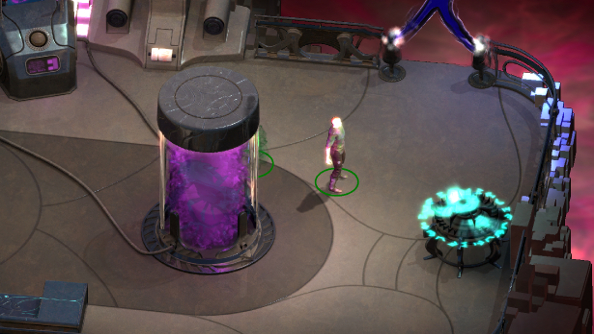
Playing Tides of Numenera feels like playing a great tabletop RPG, where the Game Master favours narrative over action-packed lootfests and dragon-slaying. That’s not surprising, since Numenera is actually the setting of a tabletop RPG, created by D&D game designer Monte Cook, which “focuses on story and ideas over mechanics.” The sometimes obtuse rules of D&D have been replaced with philosophical concepts and surrealism, making it a less fussy, though undeniably stranger, system.
In videogame terms, it’s more like an adventure game than a traditional RPG, with its long, meandering – but intriguing – conversations and esoteric puzzles.
Sometimes, it delves into the more conventional aspects of RPGs though – and right now it’s worse off for it. Take combat, for instance: plodding, turn-based fights absent excitement. Interactable objects dotted around the place might confer surprising bonuses on you or your party, requiring skill checks and a spot of luck, and conversations and story seep into battles with interesting results, but the actual act of fighting is slow and weightless and ultimately just a wee bit dull. Avoiding fights or trying to cut them short can be a lot more interesting – allowing you to be shrewd or clever rather than just violent.
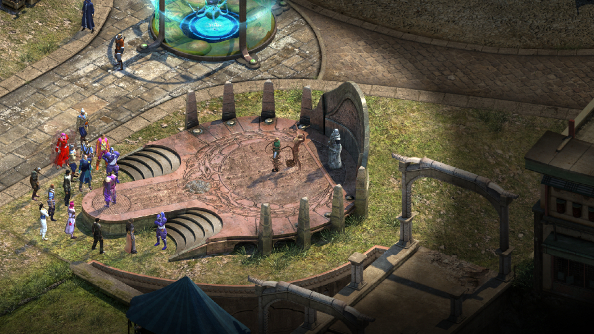
Fighting is only a tiny part of Tides of Numenera, though, and you have a lot of freedom in how you deal with the various crises that crop up during your adventure. I suspect that this might end up being one of those few games where you can get through it while hardly engaging in violence at all.
The version I’ve been exploring is the Kickstarter backers build, which is also what you lovely lot will be able to get your hands on when it launches on Steam Early Access. It represents about a fifth of the game, in a very unfinished state, and really you should avoid it unless you are willing to spoil the game for yourself a wee bit in the name of helping inXile bug hunt, which is undeniably a noble goal.
Buttons stop working, the game briefly freezes frequently, transitioning to a new area breaks the game half of the time and while none of these things are entirely unexpected in a work-in-progress, it’s hardly pleasant. And this isn’t some sandbox that you’re messing around in; it’s a story-driven RPG with a massive central mystery, and you risk dulling some of the surprise by jumping in now, long before it’s actually ready to be shown off.
